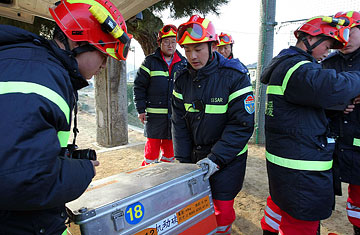
Members of a Chinese team prepare for rescue operations in Ofunato, in Iwate prefecture, Japan, on March 14, 2011
When China's Sichuan province was devastated by a 7.9-magnitude earthquake in 2008, leaving an estimated 87,000 dead or missing, the response from its chief Asian rival and longtime nemesis, Japan, was instantaneous. The government rushed a 60-member search-and-rescue team to China — the first foreign aid group to arrive. Japanese companies like Honda and Panasonic donated millions of dollars to a relief fund. Tokyo even sent a destroyer to southern China on a relief mission; it was the first port of call for a Japanese warship in China since World War II.
Now, with Japan struggling to recover from a disaster on a similarly monumental scale, it's China's turn to put aside simmering political and historical disputes — at least until the dust settles.
In the immediate aftermath of the quake, Chinese Premier Wen Jiabao offered his "deep sympathy and solicitude" as well as assistance. A 15-member Chinese search-and-rescue team arrived in Japan on Sunday. The group may not be large in number, but what's important is the fact that it is the first disaster team from China ever sent to Japan.
Symbolically significant donations are pouring in too. The Chinese Ministry of Commerce announced on Monday that China would donate about $4.5 million in humanitarian assistance as the first plane-load of blankets, tents and emergency lights flew out of Shanghai. The controversial, media-courting Chinese billionaire entrepreneur Chen Guangbiao has reportedly gone to Japan to distribute about $150,000 in aid. "Japanese rescuers moved me very much during the [Sichuan] quake," he was quoted as saying by Xinhua, the official state news agency. "Now that they are in trouble, we must help them too."
China's state-run media, meanwhile, seem to be overlooking, at least temporarily, the animosity with which it frequently regards Japan. An English-language commentary published on Saturday by Xinhua said the "willingness and readiness to help each other is just a natural reflection of the time-honored friendly bond between the two neighboring Oriental civilizations. The virtue of returning the favor after receiving one runs in the bloods of both nations."
Such statements are in marked contrast to the nationalist rhetoric that flared up in China during its most recent spat with Japan, over a set of disputed islands in the East China Sea known as Diaoyu in Chinese and Senkaku in Japanese. In September, Japanese patrol officers arrested the captain and crew of a Chinese fishing vessel that had ventured into waters near the islands, sparking a diplomatic tussle that sent relations plummeting. "Japan's irresponsible moves may eventually set fire to the Sino-Japanese relationship, or even force a military showdown," China's Global Times newspaper said in an op-ed following the incident. The dispute is far from resolved: on March 2, Japan scrambled jets to chase away two Chinese military planes that had flown within 35 miles of the islands, the closest Chinese aircraft have ever gotten to them, according to Japan's Kyodo News Agency. Japan also reiterated its concern over China's growing military power — an issue Tokyo has long argued will destabilize the balance of power in the region.
Deeply held anti-Japanese sentiment in China — a legacy of Japan's bloody invasion and occupation during the 1930s and World War II — can be seen in the mixed reactions of Chinese netizens to the earthquake. On Sina.com, one of the country's largest Web portals, some of the 280,000-plus comments on the tragedy were by Monday laced with reminders of the past. "We shall not forget national humiliation. But people are innocent. Pray for them," wrote one resident in Suzhou, in Jiangsu province. Said another netizen from Zhengzhou, in Henan province: "Life is so fragile when facing natural disasters. We pray for you because we have a kind heart. We hope you repent for your crimes in the past, too." A small number of posts were mocking and cruel.
Still, the sheer enormity of the disaster is transcending the grievances of the past. South Korea also experienced appalling brutality at Tokyo's hands — it was a Japanese colony from 1910 to 1945, a period marked by famine, forced labor and arbitrary punishment. And yet "South Korea and China were among the first rescue teams to arrive in Japan," says Lim Tai-wei, a professor in the department of Japanese studies at the Chinese University of Hong Kong. "Symbolically, this is important."
Knowing all too well the pain associated with such a devastating earthquake, some in China have expressed admiration for the Japanese response to the calamity. "The Chinese are on the whole very impressed by Japan's efforts in coping with the disaster — they see it as something very coordinated, very rehearsed and well practiced," Lim says. Many feel that China should try to learn from Japan's example, he adds, and be better prepared in the event that it is faced with another such tragedy.
